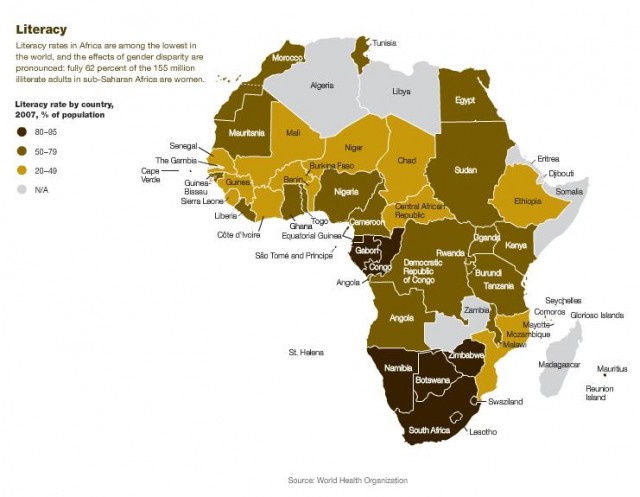Literacy
One of the greatest challenges facing modern Africa is increasing the rate of literacy—the ability to read and write—among its population. Studies have shown that literacy leads to improvements in many areas of life. These include better health and nutrition for mothers and their children, a lower infant death rate, higher productivity in agriculture, and increased political participation. However, in recent years the economic and political troubles of many African nations have led to a decline in the availability and quality of educational programs.
Literacy has benefits on many levels. It helps people to improve their thinking skills and absorb information more readily. It also changes the way that they view themselves and relate to others. On a practical level, literacy enables individuals to read printed materials such as the instructions that come with medicines and agricultural chemicals. Literate adults are more likely to understand the information and to prepare and use the products correctly. In this way, the benefit of literacy can extend beyond individuals to their families and society as a whole.

Measuring Literacy
Literacy is often difficult to measure. It does not always relate to the number of years of schooling a person completes. The quality of the educational program can make a difference in how well students learn to read and write. In some African societies the most common form of reading material is sacred texts, used for religious ceremonies. Individuals might be skillful in reading these texts but inexperienced with other types of writing, such as technical instruction manuals.
In many African countries, more than one language is spoken. Children may be taught to read in an indigenous language or in another language such as English or French. Estimating the level of literacy across the population may be complicated by the variety of languages and schools found in the culture.
Literacy in Africa
In 1961 African ministers of education met in ADDIS ABABA, ETHIOPIA, and pledged to eliminate illiteracy in 30 years. They planned to achieve this goal by making primary education universal by 1980 and by sponsoring adult education programs. The early results were impressive: by 1980 nearly 80 percent of African children were enrolled in elementary schools. In addition, some countries such as Ethiopia and TANZANIA launched large-scale adult literacy campaigns during the 1970s and early 1980s. Between 1970 and 1990, the illiteracy rate among African adults dropped from 77 to 53 percent.
In recent years, social, economic, and political problems have hindered efforts to increase literacy in Africa. Many countries have experienced high population growth and economic decline. Others have been devastated by political unrest and even civil war. By 1997 only about half of African children were attending school. Those who do attend are often taught by untrained teachers.
All of these factors have widened the gaps in literacy among African countries. By 2000 Botswana had achieved a literacy rate of 70 percent, while Burundi had a rate of only 35 percent. One promising trend noted by researchers is that parents involved in literacy programs are more likely to send their children to school and to keep them there. For this reason, various countries, including Ghana and Senegal, have recently launched national literacy campaigns. (See also Education, Languages, Literature, Publishing, Writing Systems.)